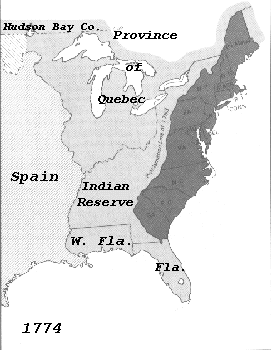|
The Quebec Act included Quebec and the Midwestern United States 1774
In 1774, Carleton persuaded the British Parliament to pass the Quebec Act. This act recognized French civil and religious rights. It also preserved the seigneurial landholding system and extended Quebec to include much of what is now Quebec, Ontario, and the Midwestern United States. The Revolutionary War in America began in 1775. The Americans asked the French Canadians to join their rebellion against Britain. But the French regarded the war mainly as a conflict between Britain and British colonies and chose to remain neutral. An American invasion of Canada in 1775 failed.
SOURCE: IBM 1999 WORLD BOOK |
All rights reserved. For details and contact information: See License Agreement, Copyright Notice. |
 Great Britain gave the name Quebec to the area that made up most of its new territory in
Great Britain gave the name Quebec to the area that made up most of its new territory in